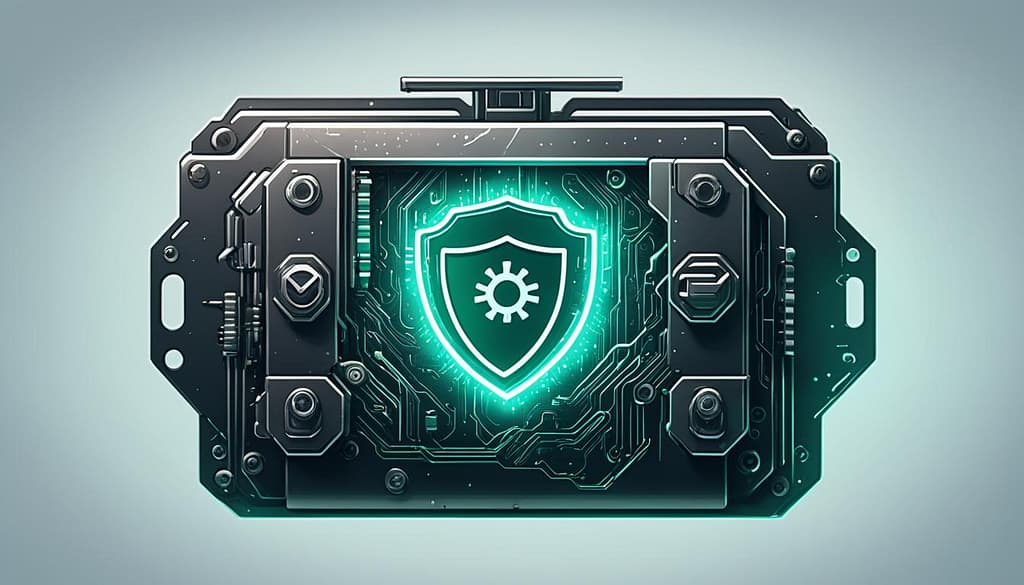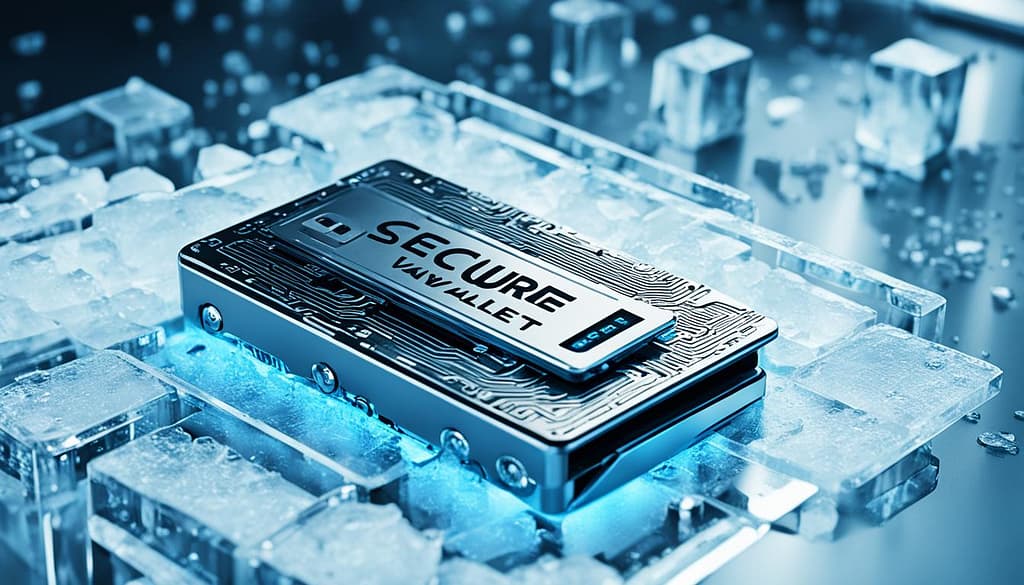Choosing a Cryptocurrency Wallet
The realm of digital currencies continues to expand, with Canadians increasingly embracing this evolution of finance. Navigating the various cryptocurrency wallet options in Canada can be daunting, but making the right choice is crucial for the security and efficiency of your crypto transactions. Whether you’re searching for the best cryptocurrency wallet for daily use or a secure crypto wallet for long-term investment, the multitude of choices demands careful consideration. How to choose a crypto wallet that aligns with your needs is a decision that requires scrutiny of features like user control, compatibility, and security provisions.
Undeniably, your wallet is the safeguard of your digital assets and therefore, examining the various types available, their security measures, and the flexibility they offer in terms of asset management is paramount. Particularly, considering the recent distressing events of crypto platform collapses, the importance of wallet security cannot be overstated. With this guide, Canadians are empowered to make informed decisions, ensuring that they select a wallet that not only meets their crypto needs but also upholds the highest standard of security.
Key Takeaways
- Evaluating the different types of wallets is key to finding one that provides both convenience and ironclad security for your digital assets.
- Non-custodial wallets give you full control over your private keys, enhancing the security of your cryptocurrencies.
- The best cryptocurrency wallet offers multi-asset support and versatility for your specific crypto activities.
- Considering the impact of recent crypto exchange collapses, the emphasis on secure crypto wallets has significantly intensified.
- Canadians have access to a diverse range of cryptocurrency wallet options, ensuring the ability to make a choice that aligns with individual preferences and security requirements.
The Importance of Cryptocurrency Wallets
Cryptocurrency wallets play a pivotal role in the digital economy, functioning not only as a repository for digital assets but as the cornerstone of security and autonomy in the blockchain realm. A robust understanding of wallet mechanisms and recent market events is integral to comprehending their significance.
Understanding the Role of Private Keys
At the heart of every cryptocurrency wallet lies the private key, a critical piece of cryptographic information that dictates ownership and the ability to execute transactions. Private keys ensure that users retain exclusive access and control over their digital assets, making them an essential component of secure crypto wallet practices. The loss or theft of a private key can equate to a loss of the corresponding digital assets, thereby emphasizing the need for secure management and storage of these sensitive details.
The Impact of Cryptocurrency Exchange Collapses on Wallet Choice
The recent tumultuous events, including the collapses of notable cryptocurrency exchanges such as FTX and BlockFi, have starkly exposed the risks associated with custodial storage solutions. These incidents have swiftly shifted the perspective of digital asset owners, illuminating the vulnerability of entrusting third parties with their private keys. As a direct response, the crypto community has increasingly gravitated towards non-custodial wallets, in search of enhanced protection and peace of mind.
Cryptocurrency wallets are, at their core, designed to protect digital currencies from unauthorized access, security breaches, and the unpredictable nature of online exchanges. Users across Canada and the globe are reassessing the ways they interact with these wallets to ensure they are leveraging the highest standards of security available.
- Non-custodial wallets offer complete control over private keys and digital assets.
- Ensuring access to a secure crypto wallet mitigates the risk of exchange collapses.
- Cryptocurrency wallets must prioritize asset security and user autonomy.
- Adopting advanced security measures is crucial in safeguarding against unwelcome access.
Understanding the critical function of cryptocurrency wallets in today’s digital asset landscape cannot be overstated. The invaluable combination of security, control, and peace of mind they offer make them an essential tool for anyone looking to navigate the dynamic world of cryptocurrencies safely.
Non-Custodial versus Custodial Wallets
In the rapidly evolving world of cryptocurrency, the debate between non-custodial and custodial wallets continues to be a focal point for users. Each wallet type offers different approaches to handling your digital assets, raising crucial questions about security, trust, and control.
What is a Non-Custodial Wallet?
Non-custodial wallets are designed to give you, the user, exclusive control over your private keys—and consequently, your cryptocurrency holdings. This control is the cornerstone of private data control, ensuring that you and you alone can access and manage your assets. The absence of third-party trust reduces the risk of losing your digital wealth due to breaches or mismanagement by others. As such, many Canadians are preferring non-custodial wallets for the security and autonomy they provide.
The Trust Issue with Third-party Custodians
The reliance on third-party custodians, as seen with custodial solutions, brings a different set of considerations into play. Trust is a significant factor, as these services hold your private keys on your behalf. The downfall of prominent crypto platforms has shed light on the vulnerability that comes with such trust. This has led to a shift in sentiment towards non-custodial wallets, which, although they put more responsibility on the user, mitigate the anxiety of dependence on external entities. The choice between these wallet types ultimately comes down to a personal preference in how you wish to manage your third-party trust and private data control.
As we explore the intricate distinctions between these wallet types, Canadian enthusiasts are increasingly prioritizing security and sovereignty over their digital assets. Consequently, non-custodial wallets have been gaining ground amongst users who are becoming more vigilant in the wake of high-profile security mishaps in the cryptosphere.
Types of Cryptocurrency Wallets
In the dynamic realm of digital currency, choosing the appropriate cryptocurrency wallet type is crucial for asset security and ease of access. The two primary categories of wallets, software wallets and hardware wallets, differ significantly in their functions and security provisions.
Software wallets include hot wallets, which are further divided into web, desktop, and mobile crypto wallets. Often favored for their convenience, these online crypto wallets are readily accessible and facilitate quick transactions, making them ideal for everyday use and active cryptocurrency trading. However, the trade-off for this convenience is a heightened security risk since these wallets are connected to the internet.
Hardware wallets, on the other hand, are a type of cold wallet. Their defining characteristic is that they are not perpetually connected to the internet, which substantially mitigates the risk of cyber intrusions. These devices are particularly recommended for the long-term storage of cryptocurrencies, where security takes precedence over frequent access.
To illustrate the distinct features and utilities of each wallet type, let’s consider their various attributes:
| Wallet Type | Typical Use Case | Security Level | Accessibility |
|---|---|---|---|
| Hot Wallets | Regular transactions, trading | Lower (due to internet connectivity) | High (accessible from any device with internet) |
| Mobile Crypto Wallets | Paying in stores, peer-to-peer payments | Medium (potential device vulnerabilities) | Very high (on-the-go access) |
| Online Crypto Wallets | Quick exchanges, web access | Lower (potential web threats) | High (instant web browser access) |
| Cold Wallets (Hardware) | Secure storage, infrequent access | Very high (offline storage) | Low (physical access required) |
For those seeking a balance between security and convenience, mobile crypto wallets provide on-the-go access while retaining a reasonable level of security, especially if combined with security measures such as biometric locking mechanisms and two-factor authentication.
In the quest for the highest echelons of security, hardware wallets stand as the bastion against unauthorized access. Brands such as Ledger and Trezor are renowned for their robust security features, including offline storage capabilities that insulate assets from the perils of online exposure.
Irrespective of the selected wallet, the non-negotiable element remains the security of digital assets. The choice between hot and cold wallets should align with the individual’s transaction frequency and security requirements. Hence, informed decision-making is pivotal in determining a wallet that aligns seamlessly with the user’s cryptocurrency engagement.
Determining the Best Cryptocurrency Wallet for Your Needs
When venturing into the world of digital currencies, one must prioritize finding the best cryptocurrency wallet to ensure the utmost security and management of assets. With the dazzling array of choices available in the market, the task of choosing a crypto wallet becomes less daunting when we focus on crucial features that align with our specific needs.
Assessing Wallet Security Features
Individuals must scrutinize wallet security features before settling on an option. The presence of technologies like two-factor authentication (2FA), hardware token support, and the ability to have multi-signature access, dictate the robustness of the security infrastructure. A wallet that allows users to retain private key access provides additional peace of mind, as this means that you have full sovereignty over your funds.
Below is a comparative overview of prominent wallets and their security features:
| Wallet Name | Two-Factor Authentication | Multi-Signature Support | Private Key Access |
|---|---|---|---|
| Ledger Nano X | Yes | No | Yes |
| Trezor Model T | Yes | Yes | Yes |
| Metamask | No | No | Yes |
| Trust Wallet | No | No | Yes |
Analyzing Wallets’ Asset Support and Versatility
The asset support provided by a cryptocurrency wallet is quintessential for users who diversify their portfolio with various cryptocurrencies, tokens, and even NFTs. Wallet versatility is increasingly important for those who wish to engage with the growing landscape of decentralized finance. Thus, it’s worthwhile to explore wallets that facilitate a seamless transition from hot to cold storage or connect with various blockchain ecosystems to leverage emerging opportunities in the crypto space.
- Ensure the wallet supports a broad range of cryptocurrencies and digital tokens.
- Check for integration with decentralized applications and services.
- Verify the ease of transferring assets to and from the wallet, including to cold storage solutions.
In summary, balancing these considerations will put you on the right path to selecting the wallet that not only provides robust security but also aligns with the flexibility demanded by modern cryptocurrency usage.
Pros and Cons of Hot Wallets
Offering both flexibility and immediacy, hot wallets are indispensable tools in the realm of cryptocurrency trading. These digital wallets are constantly connected to the internet, providing on-the-go convenience for users to engage in financial activities such as transferring funds or executing trade orders at a moment’s notice. However, the very factor that contributes to their efficiency – constant internet exposure – also opens them up to potential security risks. Given the delicate balance between hot wallet security and functional convenience, a thorough evaluation of these wallets’ advantages and vulnerabilities is essential.
Convenience vs. Security: A Balancing Act
The allure of hot wallets primarily lies in their ability to provide traders with immediate access to their assets for swift crypto transactions. The user-friendly interface of most mobile crypto wallets promotes seamless navigation, making them a favorite among digital asset traders. Nonetheless, the persistent threat of unauthorized access remains a legitimate concern that necessitates a strategic compromise. Users must therefore weigh the importance of transactional ease against the non-negotiable demand for asset protection.
Top Hot Wallets Reviewed
Several prominent hot wallets have gained traction within the crypto community, largely due to their robust feature set and user-centric approach. In an effort to aid users in making an informed decision, we examine the prominent players like the Crypto.com DeFi Wallet, Trust Wallet, and Exodus. These platforms not only support a wide array of cryptocurrencies but also incorporate integration options with hardware wallets, offering a route to enhanced security for long-term storage.
| Wallet Name | Supported Cryptocurrencies | User Experience | Security Features | Additional Services |
|---|---|---|---|---|
| Crypto.com DeFi Wallet | Wide Range | Intuitive, Mobile Optimized | Biometric Authentication, Whitelisting | Staking, DeFi Access |
| Trust Wallet | Multi-Currency | User-Friendly Interface | Secure Enclave, Pin Protection | Decentralized App Browser |
| Exodus | Diverse Asset Support | Desktop/Mobile Sync | Optional Hardware Wallet Integration | 24/7 Customer Support |
In summary, choosing the ideal hot wallet hinges on an individual’s needs for cryptocurrency trading and personal risk appetite in terms of security. While mobile crypto wallets provide unparalleled convenience, due diligence on hot wallet security should never be neglected. Recognizing the strengths and areas for improvement among various wallets drives a considered choice, aligning perfectly with a trader’s objectives.
Understanding Cold Wallets for Secure Crypto Storage
When it comes to securing your digital currency, cold wallets stand as fortresses in the face of online security threats. These devices, often in the form of hardware wallets, transcend traditional storage methods by offering an environment isolated from the internet. This offline sanctuary provides peace of mind to cryptocurrency enthusiasts, knowing that their investments are resistant to cyber intrusions.
Hardware Wallets: Ultimate Security?
Hardware wallets like Ledger and Trezor epitomize the potent blend of convenience and security. These devices are expertly designed to store private keys, ensuring that they never leave the physical device, and consequently, never exposed to potential online vulnerabilities. The beauty of hardware wallets lies in their simplicity; they serve as an impenetrable cold storage medium while remaining accessible for everyday transactions when connected to a computer or smartphone.
Choosing the Right Cold Wallet
In the pursuit of secure crypto storage, selecting the appropriate cold wallet is a pivotal decision. Factors such as price, seamless interaction with its hot wallet counterparts, and robust security features should influence your choice. Two-factor authentication and an efficient recovery process are non-negotiable features that fortify the walls of your digital treasure chest. For Canadian cryptocurrency holders, scrutinizing these aspects becomes essential, especially for those intent on preserving their assets over extended periods.
In comparing the two market leaders, Ledger and Trezor, users must evaluate their respective offerings to determine the best fit for their security and usage requirements:
| Feature | Hardware Wallet Ledger | Hardware Wallet Trezor |
|---|---|---|
| Price | Varies based on model | Varies based on model |
| Security | Secure element chip | Open-source platform |
| Compatibility | Multiple cryptocurrencies | Multiple cryptocurrencies |
| Two-factor Authentication | Supported | Supported |
| Recovery System | Recovery phrase backup | Recovery phrase backup |
“For significant crypto holdings or long-term asset preservation, hardware wallets present the pinnacle of cryptocurrency protection, combining state-of-the-art technology with tangible simplicity.”
Selecting a hardware wallet is a critical step to preserving your digital assets from unwanted breaches, elevating Ledger and Trezor as reputable bastions of crypto security favored among Canadian users. Both industry giants provide users with the invaluable assurance needed to navigate the evolving terrain of digital currencies securely.
Cryptocurrency Wallets
As the digital currency landscape continues to expand, choosing a cryptocurrency wallet that aligns with your needs is paramount. Among a plethora of options, careful consideration of key features can greatly improve the wallet user experience and ensure the safety of your assets.
Features to Consider When Choosing a Cryptocurrency Wallet
When exploring the vast array of online crypto wallets, security should be at the forefront of any decision-making process. Opt for wallets with robust security protocols to shield your digital assets from unauthorized access. Additionally, the wallet’s capability to support a wide range of cryptocurrencies and integration with decentralized apps are vital components that provide flexibility and convenience for users.
Top Crypto Wallet Features for Enhanced User Experience
A superior wallet user experience is achieved through an intuitive interface that simplifies asset management, even for novices in the cryptocurrency domain. Look for wallets offering comprehensive backup and recovery measures to protect against accidental loss. Furthermore, the ability to fine-tune transaction fees can be invaluable during periods of network congestion, providing users with greater control over their transactions.
Conclusively, the decision to select a particular cryptocurrency wallet should not be taken lightly. Consider these cryptocurrency wallet features carefully to align with your personal investment strategies and usage patterns, ensuring a seamless and secure journey in the realm of digital currencies.
Integrating Wallets with Decentralized Financial Services
The seamless fusion of cryptocurrency wallets with decentralized financial services promises a new era in the world of digital finance. This pivotal integration paves the way for investors and everyday users alike to dip into the lucrative pool of DeFi integration, facilitating a multitude of financial activities rooted in blockchain technology. Leading the charge in this space are wallets that not only store digital assets securely but also act as bridges to the thriving DeFi ecosystem.
The Rise of DeFi and Wallet Integration
Recent advancements in blockchain have ushered in a significant uptick in DeFi integration. Users now demand the ability to manage their investments, execute trades, and connect to decentralized applications (DApps) without switching between different platforms. The industry has witnessed rapid growth in wallets that offer direct integration with DeFi services—turning the traditional notions of finance on their head and handing the reins of financial sovereignty back to the users.
Wallets with DeFi and Staking Capabilities
Amidst an array of choices, certain wallets have emerged as front runners due to their robust DeFi capabilities. These wallets offer opportunities for crypto staking, allowing users to earn passive income by locking in cryptocurrencies and contributing to network security. Integration with DeFi protocols enhances wallet utility, turning a simple asset storage tool into a comprehensive financial hub. The versatility and efficiency of these wallets are constantly scrutinized in cryptocurrency wallet reviews, guiding prospective users in their pursuit of optimal DeFi engagement.
| Wallet | DeFi Integration | Staking Capabilities | User Reviews |
|---|---|---|---|
| MetaMask | Full | Limited | Highly positive for interface and DApp connectivity |
| Trust Wallet | Extensive | Available | Strong security features and user-friendly experience |
| Argent | Native | Native | Praised for tighter DeFi integration and ease of use |
Reviews and Ratings: Navigating Cryptocurrency Wallet Reviews
In the ever-evolving world of digital currencies, Canadians are increasingly on the lookout for top crypto wallets that strike the perfect balance between security and convenience. As such, delving into cryptocurrency wallet reviews becomes an indispensable part of the selection process. Thorough reviews provide in-depth analyses of user interfaces, fortification features, ancillary services, and compatibility with diverse cryptocurrencies, offering vital insights to potential users.
Yet, amidst a sea of options, it is the wallet ratings that often catch one’s eye first. These ratings, synthesized from user experiences and expert evaluations, are instrumental in identifying wallets that are not just popular but also match one’s personal security threshold and feature needs. Nevertheless, it’s prudent to also seek out bona fide testimonials that paint a realistic picture of what it’s like to use these wallets on a day-to-day basis.
A solid and secure crypto wallet must meet specific criteria to be deemed dependable. It should offer robust protection against unauthorized access, support a wide array of digital assets, and provide a user-friendly experience that does not compromise on safety. Below is a comparative overview of some credible wallet options, centered on these very attributes:
| Wallet Name | User Experience | Security Features | Asset Support | Interoperability |
|---|---|---|---|---|
| Ledger Nano X | Straightforward interface with Ledger Live app | 2-factor authentication, Secure Element (SE) chip | Supports over 1,800 coins and tokens | Compatible with 50+ wallet apps for broader ecosystem access |
| Trezor Model T | Touchscreen for enhanced user interaction | Advanced passphrase entry, U2F authentication | Wide range of supported cryptocurrencies | Access to Trezor Suite and third-party interfaces |
| MetaMask | Intuitive browser extension and mobile app | Encrypted keys on device, optional hardware wallet integration | Ethereum and ERC-20 tokens primarily | Seamless connection with a multitude of DeFi and dApps |
| Trust Wallet | Mobile-first approach with an engaging user interface | Standard encryption and security practices | Multichain support for numerous cryptocurrencies and NFTs | Direct trading via built-in DEX and staking support |
Carefully researching and comparing the available wallets, taking into account both the intricate details in the reviews and the broader implications of ratings, will point Canadian crypto enthusiasts toward a wallet that aligns with their individual requirements – a secure vault for their digital assets.
Conclusion
The path to selecting the optimal cryptocurrency wallet options in Canada requires a careful examination of various critical elements. Key considerations include robust security protocols to shield your digital wealth, compatibility with a diverse array of cryptocurrencies and digital assets, and the capacity to integrate with decentralized financial services effortlessly. This multi-faceted approach ensures that you, as a user, can manage your cryptocurrencies efficiently and securely.
When deliberating how to choose a crypto wallet, it becomes evident that non-custodial wallets afford you greater sovereignty over your private keys, thus fortifying your control over your digital assets. This increased control, however, comes with the responsibility of thoroughly safeguarding your keys. On the flip side, opting for hot or cold wallets depends on your preferences for accessibility versus security. Cold wallets come highly recommended for those seeking a fortress for their long-term holdings, while hot wallets provide more immediate access required for daily trading and transactions.
The journey towards identifying the top crypto wallets in the marketplace can be navigated through a blend of in-depth user reviews and personal due diligence. By meticulously analyzing these wallets against your personal cryptocurrency interactions and objectives, you can single out a solution that not only protects your digital currencies but also enhances your overall user experience. In essence, marrying security with functionality is the cornerstone of proficiently and securely managing your digital currencies within the Canadian landscape.
FAQ
What factors should be considered when choosing the best cryptocurrency wallet?
What is the difference between non-custodial and custodial wallets?
How do hardware wallets provide enhanced security for cryptocurrency storage?
What are the pros and cons of using hot wallets for cryptocurrency?
Can cryptocurrency wallets interact with decentralized financial services?
Why is it important to read cryptocurrency wallet reviews and check ratings?
What role do private keys play in cryptocurrency wallets?
What impact have recent cryptocurrency exchange collapses had on wallet choice?
What is the importance of wallet versatility and asset support?
How do you assess the security features of cryptocurrency wallets?
Source Links
- https://www.bitcoin.com/get-started/how-to-choose-the-right-crypto-wallet/
- https://academy.binance.com/en/articles/crypto-wallet-types-explained
- https://www.nerdwallet.com/article/investing/best-bitcoin-cryptocurrency-wallet










